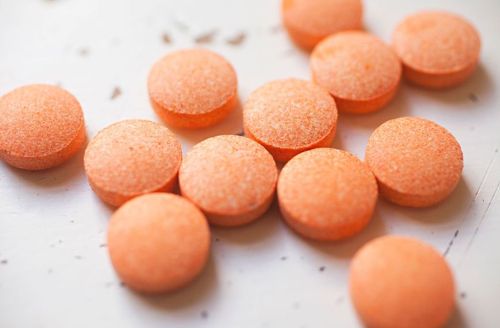Feeling the burn? Try these natural remedies for UTIs
While you wait for your antibiotics to kick in, try one of these natural remedies for UTI to help ease the worst of your symptoms.

Out of all of life’s many annoyances, UTIs rank pretty high (probably somewhere above “trip to the DMV,” but below “bridal party email thread”). If you have yet to actually experience one, consider yourself lucky: They’re inconvenient, incredibly uncomfortable and sometimes painful reminders that being a lady is super fun.
Urinary tract infections happen when bacteria gets trapped in the bladder, urethra, or any other part of the urinary system. While men do occasionally get them, they’re way more common in women (like, we get them 30 times as often as men do!). And that’s down to anatomy: Because a woman’s urethra is shorter than a man’s, it’s easier for bacteria to enter and make itself at home.
Most UTIs are caused by E. coli, which can enter the urethra post-sex or after improper wiping. The bacteria can take root and replicate, leading to an infection of either the bladder (which is called cystitis) or urethra (called urethritis).
If you experience symptoms such as burning or painful urination, the urge to pee frequently (even when you know you don’t have to), cloudy or strange-smelling urine, or see blood or pus in your urine, you might have a UTI.
Left untreated, a UTI could easily spread to your kidneys and cause lasting damage, which is why you should make an appointment with your doctor stat. They’ll likely do a culture to determine if your symptoms are due to a UTI or some other infection and treat you accordingly. If you have a UTI, your doc will prescribe antibiotics, which (thankfully) get to work surprisingly quickly.
While you wait for the antibiotics to kick in, there are some easy natural remedies for UTIs that can help alleviate your symptoms and prevent UTIs in the future.

1. Drink more water
You should be drinking plenty of water anyway, but if you aren’t always great about remembering to fill up your water bottle in the middle of the day, it’s important to make an effort to increase your water intake if you’ve been diagnosed with (or suspect you have) a urinary tract infection. The more water you drink, the more you’ll have to pee; the more you pee, the more bacteria will be flushed out of your urethra every time you use the bathroom.
Upping your H20 consumption may also help prevent UTIs in the future, according to a 2017 study of 140 premenopausal women dealing with recurring infections. Study participants were divided into two groups; one group stuck to their usual water-drinking habits over the course of a year, while the other group drank an additional 1.5 liters of water a day (on top of their usual fluid intake). By the end of the study, the group drinking extra water saw a “significant” decrease in the mean number of infections compared to the control.
2. Reach for the (unsweetened) cranberry juice
Cranberries (and cranberry juice) have long been touted as a way to prevent urinary tract infections. That’s because cranberries contain a specific kind of polyphenol (a compound found in plants) that acts on E. coli and other bacteria as an anti-adhesive, making it harder for the harmful microorganisms to stick to urethra walls.
However, it should be noted that research is mixed on the subject—most recently, a 2017 review found that “limited evidence exists for cranberries in reducing the risk of [recurrent UTIs],” and that “evidence for cranberry juice in preventing UTIs was less than previously thought,” although it noted that there aren’t any known downsides to drinking the stuff, either. (And some experts still recommend drinking cranberry juice as a preventative measure.)
If you do want to give cranberry juice a try, skip the cranberry cocktail in the juice aisle of your local grocery store and opt for the unsweetened variety instead. Sugary beverages can irritate your bladder, which will only make you feel worse than you already do. (BTW, you should also hold off on drinking coffee, alcohol and soda while you’re being treated for a UTI.)
3. Pop some vitamin C
In addition to its overall immunity-boosting properties, vitamin C may help reduce the risk of urinary tract infections by making urine more acidic, thereby limiting bacteria growth. The authors of the metastudy mentioned above also say that vitamin C plays quite nicely with methenamine hippurate (MH), an antibiotic commonly used to treat urinary tract infections. MH reacts with acid in the urine to create formaldehyde, which is deadly to E. coli and other bacteria. So basically vitamin C could help your antibiotics work even better.
4. Pee when you need to …
You may pride yourself on your ability to sit through marathon meetings without taking a bathroom break, but don’t sacrifice your bladder just because you don’t want to miss a minute of your boss’s riveting quarterly sales projections. If you habitually hold in your pee, research suggests you could be putting yourself at risk for a UTI. The longer urine sits in your bladder, the more time bacteria that has entered your urethra has to settle in and multiply.
5. …and definitely, definitely pee after sex
Although the jury is still out on whether or not there’s actually a relationship between peeing after intercourse and UTIs, there is some scientific evidence that women who go to the bathroom before and after sex are much less likely to get UTIs than women who do not. (That same study also found that there may be a connection between diaphragm and spermicide use and UTIs.)
6. Apply heat
If you’re dealing with pain in your lower belly thanks to your UTI, a heating pad or hot water bottle may provide temporary relief.
7. Try garlic (extract) or bearberry leaf
A 2009 study of male rats showed a “statistically significant” drop in bacterial growth and inflammation when the rats were given garlic, while the author of a 2010 study found that garlic extract had an antimicrobial effect even on some antibiotic-resistant strains of S. aureus and E. coli. And in a small study of 57 women suffering from recurring UTIs, the group who supplemented with bearberry leaf (a.k.a. uva-ursi) saw a significant decrease in the number of recurring infections compared to the control group over the course of the year-long study.
It should be noted that these studies are small, and some of them were only on rats or in a petri dish—so take these findings with a grain of salt. And as with all herbal supplements, talk to your doctor first to make sure they don’t interact with any other meds you’re taking.
You may also be able to try D-mannose for UTI. It’s a supplement made from a natural sugar found in certain fruits, and works by decreasing the amount of bacteria that sticks to your bladder lining, per a March 2022 study in Nutrition Journal. While it can’t cure your infection, it may be a good preventative method for recurrent UTIs.
Sign Up for Our Daily Newsletter
Get all the latest in wellness, trends, food, fitness, beauty, and more delivered right to your inbox.
Got it, you've been added to our email list.










